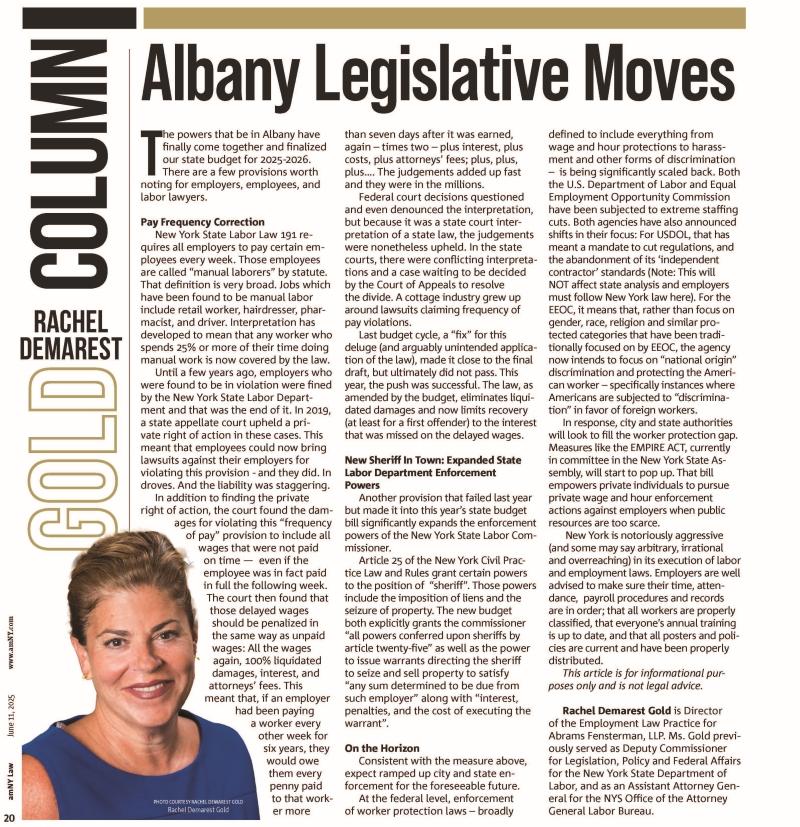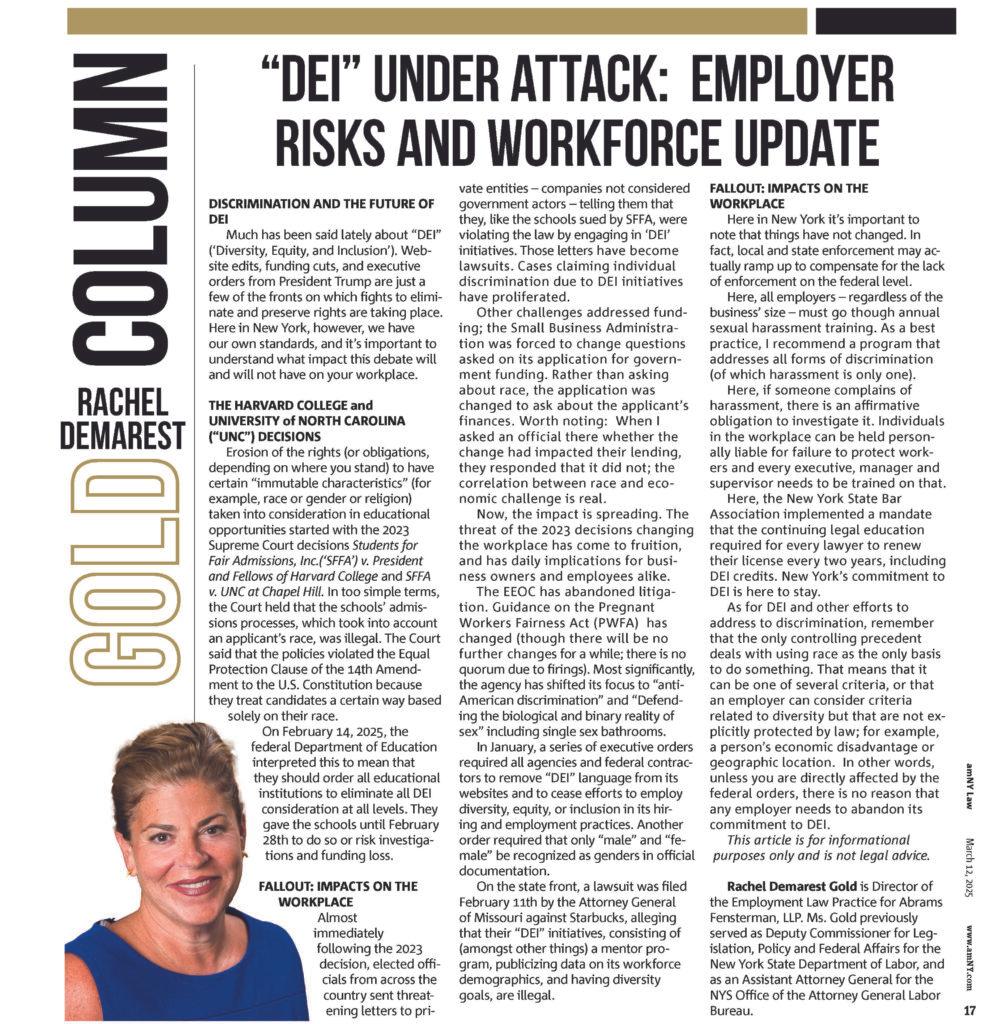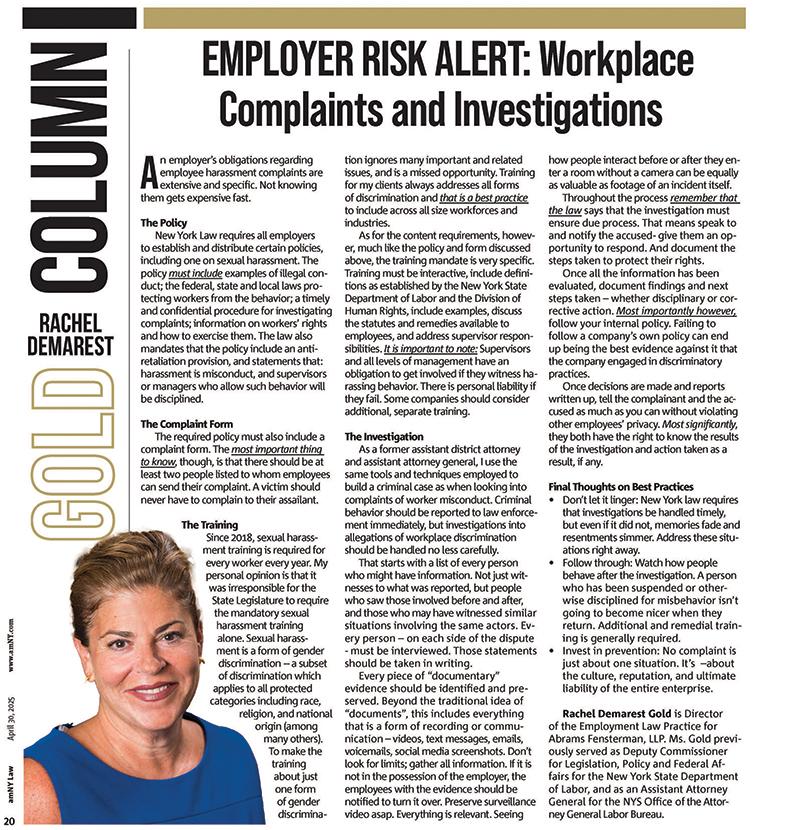This article was published in the June 11, 2025 edition of amNY Law.
The powers that be in Albany have finally come together and finalized our State Budget for 2025-2026. There are a few provisions in there worth noting for employers, employees, and labor lawyers alike.
Pay Frequency Correction
New York State Labor Law 191 requires all employers to pay certain employees every week. Those employees are called “manual laborers” by statute. That definition is very broad. Jobs which have been found to be manual labor include retail worker, hairdresser, pharmacist, and driver. Interpretation has developed to mean that any worker who spends 25% or more of their time doing manual work is now covered by the law.
Until a few years ago, employers who were found to be in violation were fined by the State Labor Department and that was the end of it. In 2019, a State Appellate Court upheld a private right of action in these cases. This meant that employees could now bring lawsuits against their employers for violating this provision – and they did. In droves. And the liability was staggering.
In addition to finding the private right of action, the Court found the damages for violating this “frequency of pay” provision to include all wages that were not paid timely – even if the employee was in fact paid in full the following week. The Court then found that those delayed wages should be penalized in the same way as unpaid wages: All the wages again, 100% liquidated damages, interest, and attorneys’ fees. This meant that, if an employer had been paying a worker every other week for six (6) years, they would owe them every penny paid to that worker more than 7 days after it was earned, again – times two – plus interest, plus costs, plus attorneys’ fees; plus, plus, plus…. The judgements added up fast and they were in the millions.
Federal court decisions questioned and even denounced the interpretation, but because it was a state court interpretation of a state law, the judgements were nonetheless upheld. In the state courts, there were conflicting interpretations and a case waiting to be decided by the Court of Appeals to resolve the divide. A cottage industry grew up around lawsuits claiming Frequency of Pay violations.
Last Budget cycle, a “fix” for this deluge (and arguably unintended application of the law), made it close to the final draft, but ultimately did not pass. This year, the push was successful. The law, as amended by the Budget, eliminates liquidated damages and now limits recovery (at least for a first offender) to the interest that was missed on the delayed wages.
New Sheriff In Town: Expanded State Labor Department Enforcement Powers
Another provision that failed last year but made it into this year’s State Budget Bill significantly expands the enforcement powers of the New York State Labor Commissioner.
Article 25 of the New York Civil Practice Law and Rules grant certain powers to the position of “sheriff”. Those powers include the imposition of liens and the seizure of property. The new Budget both explicitly grants the Commissioner “all powers conferred upon sheriffs by article twenty-five” as well as the power to issue warrants directing the sheriff to seize and sell property to satisfy “any sum determined to be due from such employer” along with “interest, penalties, and the cost of executing the warrant”.
On the Horizon
Consistent with the measure above, expect ramped up City and State enforcement for the foreseeable future.
At the federal level, enforcement of worker protection laws – broadly defined to include everything from wage and hour protections to harassment and other forms of discrimination – is being significantly scaled back. Both the U.S. Department of Labor and Equal Employment Opportunity Commission have been subjected to extreme staffing cuts. Both agencies have also announced shifts in their focus: For USDOL, that has meant a mandate to cut regulations, and the abandonment of its ‘independent contractor’ standards (Note: This will NOT affect state analysis and employers must follow New York law here). For the EEOC, it means that, rather than focus on gender, race, religion and similar protected categories that have been traditionally focused on by EEOC, the Agency now intends to focus on “national origin” discrimination and protecting the American worker – specifically instances where Americans are subjected to “discrimination” in favor of foreign workers.
In response, City and State authorities will look to fill the worker protection gap. Measures like the EMPIRE ACT, currently in committee in the Assembly, will start to pop up. That bill empowers private individuals to pursue private wage and hour enforcement actions against employers when public resources are too scarce.
New York is notoriously aggressive (and some may say arbitrary, irrational and overreaching) in its execution of labor and employment laws. Employers are well advised to make sure their time, attendance, and payroll procedures and records are in order, that all workers are properly classified, that everyone’s annual training is up to date, and that all posters and policies are current and have been properly distributed.
Rachel Demarest Gold is Director of the Employment Law Practice for Abrams Fensterman, LLP. Ms. Gold previously served as Deputy Commissioner for Legislation, Policy and Federal Affairs for the New York State Department of Labor and as Assistant Attorney General in the Labor Bureau of the Attorney General for New York.






